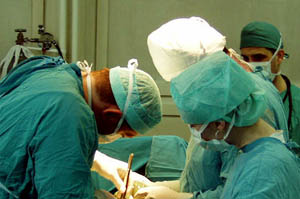Back surgery on the NHS
Though there are a number of public funded health organizations in the world, one of the biggest of them is the NHS. If you live in the UK and are facing pain in the back, and the doctor recommended surgery in the back, it is time you went in for back surgery on the NHS. However, before you opt in for back surgery on the NHS, you should try and learn more about the different types of back pain. The pains in the back can be segregated into two different types. The first one is acute where the pain in the back appears all of a sudden and lasts for fewer than 3 months.
The other type of back pain is chronic pain where the pain in the back develops over a period of time and persists for greater than twelve months plus also causes problems for a long time. Your doctor will identify these problems before you opt in for back surgery on the NHS. Just because you have pain in the back that is persisting and severe does not mean that you require back surgery on the NHS. On many occasions conservative treatments like gentle massage, application of anti inflammatory balms, heat & ice treatment, physical therapy, and gentle massage does not work, then it is time for opting in for back surgery on the NHS.
There are some other things you can try before opting in for back surgery on the NHS. You can try taking over the counter painkillers and see if they help or not. Taking paracetamol generally helps get rid of mild back pains. If it does not then still it does not mean that you are a likely candidate for back surgery on the NHS. At times the pain can be removed with the help of drugs like optiate linked painkiller which should be taken along with paracetamol.
There are also occasions when a simple muscle relaxant like diazepam also helps. What is being hinted is that you need to ascertain whether the pain in your back required back surgery on the NHS or whether they can be cured by the usage of drugs. Do not forget that some of these drugs, like diazepam, can cause extreme drowsiness and hence one should not drive at least for 24 hours after taking the medicine. However, when it has been identified by the surgeon that you do require back surgery on the NHS, you should also know about the different routes of treatment that the surgeon might opt in for.
There are different types of procedures for back surgery on the NHS and they include Disectomy & fusion surgery. The former is done by removing part of the herniated disc, which is pressing on your nerve and thereby causing pain in your back. If the surgeon conducting back surgery on the NHS observes that the vertebra has slipped out of place, he or she might fuse it back into place using some metal rods.
Back to Top
There are some other things you can try before opting in for back surgery on the NHS. You can try taking over the counter painkillers and see if they help or not. Taking paracetamol generally helps get rid of mild back pains. If it does not then still it does not mean that you are a likely candidate for back surgery on the NHS. At times the pain can be removed with the help of drugs like optiate linked painkiller which should be taken along with paracetamol.
There are also occasions when a simple muscle relaxant like diazepam also helps. What is being hinted is that you need to ascertain whether the pain in your back required back surgery on the NHS or whether they can be cured by the usage of drugs. Do not forget that some of these drugs, like diazepam, can cause extreme drowsiness and hence one should not drive at least for 24 hours after taking the medicine. However, when it has been identified by the surgeon that you do require back surgery on the NHS, you should also know about the different routes of treatment that the surgeon might opt in for.
There are different types of procedures for back surgery on the NHS and they include Disectomy & fusion surgery. The former is done by removing part of the herniated disc, which is pressing on your nerve and thereby causing pain in your back. If the surgeon conducting back surgery on the NHS observes that the vertebra has slipped out of place, he or she might fuse it back into place using some metal rods.
Back to Top

